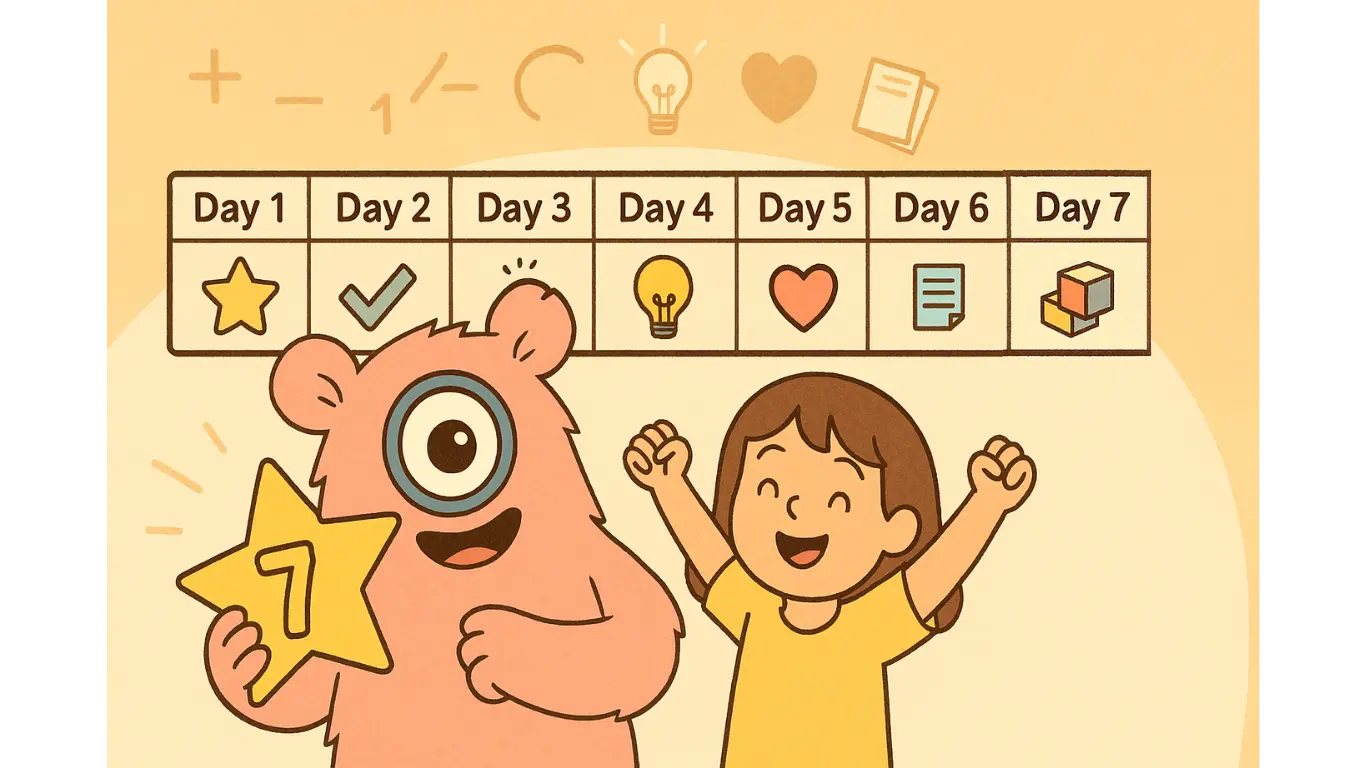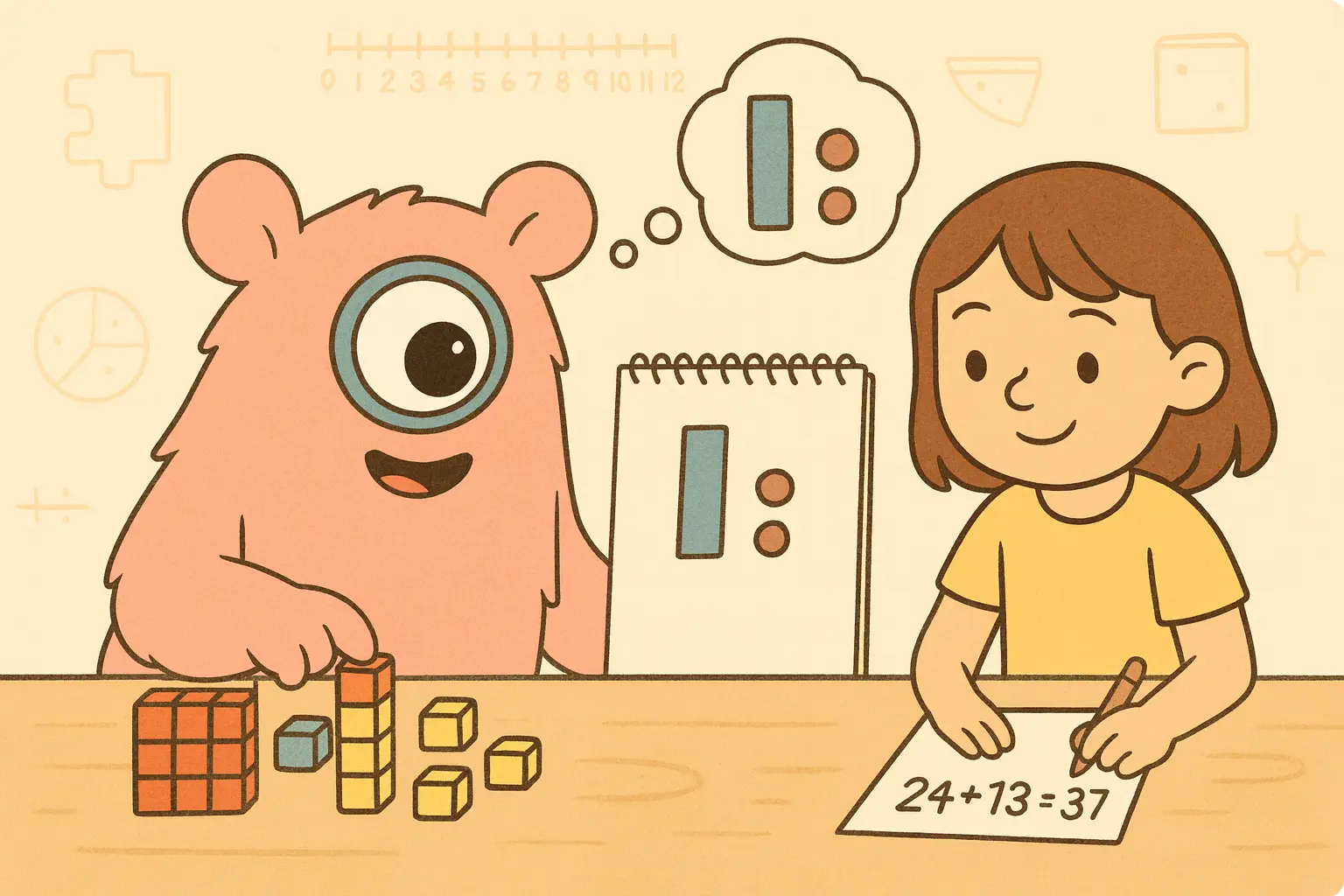7 Quick Wins That Build Math Confidence in Just One Week
TL;DR:Confidence grows fast when kids get small, repeated successes. In one week, try these seven research-backed “quick wins”: effort-based feedback, short daily spaced practice, mini retrieval quizzes, worked examples with immediate feedback, hands-on manipulatives (CRA), a 5-minute anxiety reset (expressive writing), and fun bedtime math chats. Each is supported by peer-reviewed studies and scales from elementary learners to teens and adults.
Want a calmer homework hour and a child who says, “Hey, I can do this”? You don’t need a semester-long overhaul - just seven days of smart, bite-size tweaks. Below are evidence-based “quick wins” parents can run at home (teachers and tutors too), with options for older students and adults. Think of each day as a tiny experiment: pick one lever, keep the time box small (5–15 minutes), and collect a visible “win” your child can point to by bedtime. Those quick wins compound into self-belief surprisingly fast.

Quick Win #1 (Day 1): Switch to Effort-Based, Specific Feedback
Confidence is really just a pile of little “I did it!” moments. One simple way to stack those moments is to shift from “You’re so smart” to “Your practice and strategies are working.” That kind of effort-focused feedback nudges kids to believe their progress is in their control - and a 2020 meta-analysis on educational feedback shows that specific, task- and process-focused comments are among the most powerful ways to accelerate learning. Try it for a week and watch how quickly kids start spotting what’s working.
Try it today:
After each problem, name the strategy you saw (“You drew a number line; that helped”) and add one next step. Keep a sticky note of “praise stems” handy (e.g., “I noticed…”, “You improved by…”), and aim for a 3:1 ratio of specific praise to corrections. Pair this with our routines from Math Homework Without Meltdowns for smoother sessions.
Quick Win #2 (Day 2): 10 Minutes of Spaced Practice
Think “a little today, a little tomorrow.” Short, daily review beats big weekend cram sessions because the brain strengthens memories when it revisits ideas after a gap. In fact, a 2022 study found that learners who spaced study sessions by roughly eight hours remembered more and forgot more slowly over time, highlighting how smart scheduling (not more time) boosts retention.
Try it today:
Make a 10-card review deck (facts, word-problem setups, fraction models). Shuffle and practice for 10 minutes, every day this week. Mix two “easy wins” with one “stretch” card so momentum stays high, and track streaks with a simple sticker grid your child can update. Want visuals that reduce cognitive load? See our Visual Math Strategies.
Quick Win #3 (Day 3): Quick Recall Warm-Up (Retrieval Practice)
Instead of re-reading, try remembering. Those quick “Can you bring it back?” moments - what teachers call retrieval practice - pack a bigger punch because recalling info strengthens the memory pathways, and doing it repeatedly beats re-reading for long-term learning. Kids usually feel a little jolt of confidence the second an answer pops back. So before homework, kick things off with one friendly warm-up recall question and let them enjoy that quick win.
Try it today:
Ask one warm-up problem before homework begins (yesterday’s skill). If it’s wrong, model the step and let your child immediately re-retrieve with a near-twin problem. Rotate your pop quiz moments (morning, after school, at dinner) to keep it fresh, and celebrate the attempt as much as the answer to reduce pressure.
Quick Win #4 (Day 4): Start with Worked Examples, Then Fade Support
When a new skill looks tricky, start with a clean walk-through. Worked examples let kids see the path before they hike it - reducing overload and boosting success, especially for beginners; a math-specific meta-analysis found that studying step-by-step solutions improves accuracy and transfer, and a classroom study reported measurable gains when teachers used example-first lessons before independent practice.
Try it today:
Use an “I do → we do → you do” sequence: present one example, co-solve a second with prompts, then have your child solve a similar one alone with immediate feedback. After the solo attempt, invite a 30-second “explain your step” to surface thinking, then gradually remove hints across the next two problems.
Quick Win #5 (Day 5): Make It Concrete with Manipulatives (CRA)
Numbers click faster when kids can touch, move, and see them. The Concrete-Representational-Abstract pathway (objects → sketches → symbols) keeps thinking manageable and builds real understanding. Less strain on working memory, more “Ohhh, now I get it.”

Try it today:
Build 2-digit addition with base-ten blocks (or LEGO) → sketch tens/ones → switch to standard notation. For fractions, use pizza slices or paper strips before shifting to number lines and symbols. For more ideas, see our movement-and-manipulatives roundup: Kinesthetic Games for Place Value & Estimation.
Quick Win #6 (Day 6): 5 Minutes of Calm - Write the Worries Out
Butterflies before math? Totally normal - and fixable. A short pre-work ritual of expressive writing helps kids put worries on paper so they don’t crowd working memory. Two to five minutes is plenty - just a brain dump, no grammar police - and you can even toss the page when you’re done. It works for teens and adults too; the goal isn’t poetry, it’s offloading noise so the signal (the math) has room.
Try it today:
Before quizzes or tricky homework, set a timer and let your child jot “What’s the worst that could happen?” and “What do I already know?” Then start with an easy win to build momentum. If writing feels hard, try a quick voice note or draw-your-worry sketch, followed by two deep breaths and a tiny first step.
Quick Win #7 (Day 7): 5-Minute Bedtime Math Talk
End the day with a playful math chat, not a worksheet. Those little conversations boost comfort and competence - especially for families where grown-ups feel math-nervous too. Keep it short and cozy - pillows, pajamas, and one curious question - so it feels like story time, not study time. Over a week, these tiny chats build a “we do math here” family habit that nudges confidence up without pressure.
Try it today:
Ask one playful question (“We have 12 grapes and 3 people - how many each if fair?”) or co-play a kid-friendly math app for 5 minutes. Keep it light and celebratory. Rotate roles - let your child be the “teacher” and invent tonight’s problem - to deepen ownership. For game-based ideas kids love, browse our Board Games That Sneak In Math.
Conclusion
Give it seven days and notice the tiny shifts: a few more “I can do this” moments, a little less friction, and a lot more smiles. Don't chase perfection - you’re stacking small, doable wins that add up to real confidence. Keep it light, celebrate the effort, and let progress be the star. Here’s to calmer homework time and a kid (or grown-up!) who looks at math and thinks, “Yeah, I’ve got this.”
FAQs
How fast can confidence really change?
Faster than you’d think. When kids rack up controllablewins (effort-based praise + right-sized problems), self-belief moves quickly - exactly the pattern seen when feedback focuses on strategies and process.
What if my child already “hates math”?
Start simple and concrete. Use CRA, show one worked example, then try a single low-stakes retrieval question. You’re lowering cognitive load, and research on worked examples shows that clearer explanations make early success much more likely.
Apps like Monster Math also help get kids to find Math fun and stop hating it.
References
- Wisniewski, B., Zierer, K., & Hattie, J. (2020). The Power of Feedback Revisited: A Meta-Analysis of Educational Feedback Research. Frontiers in Psychology, 10, 3087. Open Access
- Kornmeier, J., Sosic-Vasic, Z., & Joos, E. (2022). Spacing learning units affects both learning and forgetting. Trends in Neuroscience and Education, 100173. PubMed
- Roediger, H. L., & Karpicke, J. D. (2006). The power of testing memory: Basic research and implications for educational practice. Perspectives on Psychological Science, 1(3), 181–210. DOI link
- Barbieri, C. A., et al. (2023). A meta-analysis of the worked-examples effect on mathematics performance. Preprint/peer-reviewed manuscript. PDF
- Lange, C., et al. (2021). The effects of example-free instruction and worked examples. Frontiers in Education. Open Access
- CRA effectiveness meta-analysis (2024). Journal of Special Education / SAGE. Article
- Ramirez, G., & Beilock, S. L. (2011). Writing about testing worries boosts exam performance in the classroom. Science, 331(6014), 211–213. Abstract
- Berkowitz, T., et al. (2015). Math at home adds up to achievement in school. Science, 350(6257), 196–198. PubMed

Comments
Your comment has been submitted